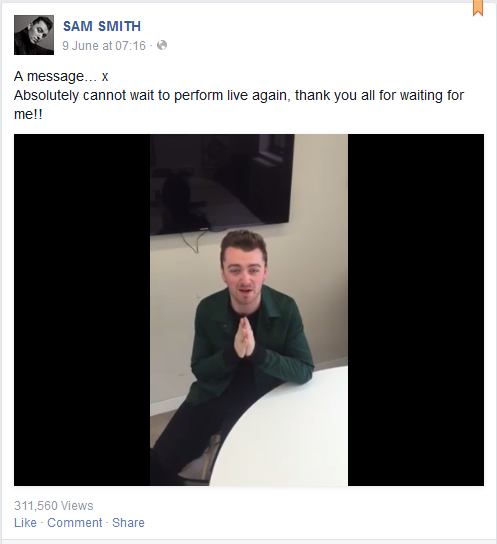There are approximately 2.078 billion active accounts across social media sites such as Facebook, Twitter and Youtube. It is unquestionably the most effective medium to connect to your fan base, and forming an online following to market yourself to can greatly impact on your marketing goals. The ease of which content can be shared is extremely beneficial when attempting to get your music noticed, and some of the most successful artists in the music industry utilise these platforms extensively. 7 of the 10 most followed people on Twitter are in the music industry, with Katy Perry leading the way with nearly 67 million followers and Justin Bieber following closely behind with 61.5 million followers.
Here are the top five tips for effectively marketing music via social media:
Use different sites
Social media usage has become increasingly fragmented over time. Whereas just one or two social media accounts was enough, these days your audience can be spread over many more. Having a presence on each social media site will expand your reach and can be used to drive your fan base to other content on your website or other social media sites.
Facebook, Twitter and Instagram are valuable for personally interacting with your audience and keeping them engaged with your music; whilst music-centric social media sites such as Youtube, Myspace and Soundcloud are great for posting your music and encouraging music downloads.
YouTube receives more than one billion unique visitors every month and is the second most searched platform after Google. Facebook attracts roughly seven times the engagement that Twitter does, for both smartphone and PC usage. SoundCloud has 250-million monthly active listeners and over 90% of new uploads are listened to.
Ultimately, different social media sites will have different user behaviours associated with it, and your social media plan should be adapted according to each channel. Adjust the message, tone and content to suit the audience on each platform for maximum effectiveness.
Consistency
Once you have established yourself on social media sites, it is imperative to keep your presence constant. Thinking of yourself as a brand rather than a musician or a band is a smart strategy for keeping your followers entertained and making your ‘brand’ recognisable.
Keeping a consistent look across your different social media sites will help to assert who you are as an artist and set you apart from the vast amounts of competition in the music industry. This is crucial for gaining exposure and increasing your fan base.
Mix up your posts
Posting static, written content on its own may not be enough to engage your audience or promote your music sufficiently. A successful approach will also incorporate pictures, music and web videos, blogs and video blogs with links to maintain the audiences’ attention.
Communicating with your audience directly is also a good way to connect with them on a personal level and entice them to visit your website, your social networking page or to download your songs.
As mentioned above, different social media sites have different user characteristics and behaviour and it is imperative that posts are unique on each site to suit them. For example, Facebook users respond better to visual and interactive posts than they do on Twitter. Thus, it makes sense to post links to your Youtube music videos or Soundcloud account. In December 2014, Facebook videos received more than 80% of video all interactions.
Don’t be shy to express your personality when you communicate with your fan base. Share more about yourself and be more transparent is the key success. Ultimately, social media posts should be diverse but relate to your music and your audience to maintain engagement.
Post frequently
Building a social media following means keeping an updated profile your fans want to follow. Overloading them with repetitive and obvious promotional material will bore them, however, you do not want them to forget about you. Finding the middle ground is difficult and will differ for every musician, but it is well worth trying and testing this with metrics such as ‘likes’ and ‘shares’ given on social media sites for guidance.
An effective social media strategy to follow is to post content which gives an insight into the life of the musician or the band. For example, if you’re in the studio recording a new album, tell a story about your studio experience that day, share a behind the scenes photo, or post a short teaser Vine of your song. These posts keep fans updated on what’s going on, but are not obviously promotional.
These are two very good examples of content which promotes something indirectly, whilst keeping fans updated on what the artist is doing.


Link back to your website
When people engage with your social media accounts, they send ‘social signals’ to Google and help to improve the main websites’ ranking on the search results page. It is also the perfect source to drive additional traffic to your website, where you can collect and analyse data on your audience and how they interact with your content to improve your marketing plan.
Posting short teaser clips of new songs or a music video and linking it to the website is a great way to incite curiosity and get people to check out more of your music. Create a music playlist on the landing page to make this easier for the user. The more they interact with the website, the better you will rank on the search results page.
Use the main website to reiterate and continue the messages that are being conveyed on the social media sites. Keeping it updated with new music, upcoming shows and contact information is crucial to efficiently promote your music.
Summary
If you are to take anything away from this, it is the knowledge that you need to establish a presence across multiple social media sites, post frequently and have a consistent image to make you and your music recognisable. However, your content is just as important as your marketing plan, so make sure you engage your fans so that they want to know what you are up to.


